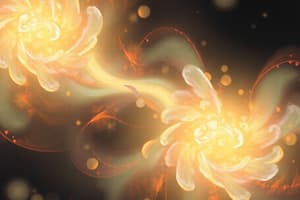Podcast
Questions and Answers
Plasma is the least common form of visible matter in the universe.
Plasma is the least common form of visible matter in the universe.
False (B)
Bose–Einstein condensates and neutron-degenerate matter are only observable in everyday life.
Bose–Einstein condensates and neutron-degenerate matter are only observable in everyday life.
False (B)
Matter in the liquid state has a fixed volume and shape.
Matter in the liquid state has a fixed volume and shape.
False (B)
Quark–gluon plasmas are currently observable states of matter, not theoretical.
Quark–gluon plasmas are currently observable states of matter, not theoretical.
Solids can change their shape without the application of force.
Solids can change their shape without the application of force.
Iron has a face-centered cubic structure at temperatures below 912 °C.
Iron has a face-centered cubic structure at temperatures below 912 °C.
Ice has ten known crystal structures, or ten solid phases.
Ice has ten known crystal structures, or ten solid phases.
Glasses and other non-crystalline solids have long-range order.
Glasses and other non-crystalline solids have long-range order.
Liquids have a definite shape and a constant volume independent of pressure.
Liquids have a definite shape and a constant volume independent of pressure.
Gas molecules have very strong bonds between them.
Gas molecules have very strong bonds between them.
Flashcards are hidden until you start studying
Study Notes
Forms of Matter
- Plasma is the least common form of visible matter in the universe, representing a unique state where gases are ionized.
- Bose–Einstein condensates and neutron-degenerate matter are primarily observable under specific conditions, not typically encountered in daily life.
Properties of Liquids and Gases
- Liquids maintain a fixed volume but adapt to the shape of their container, showcasing fluidity.
- Gases have very weak intermolecular bonds, allowing molecules to move freely and expand to fill available space.
Characteristics of Solids
- Solids maintain a defined shape under normal conditions, but they can deform without external force through elastic or plastic deformation.
- Iron possesses a face-centered cubic structure at temperatures below 912 °C, which affects its mechanical properties.
- Ice exhibits ten known crystal structures or solid phases, indicating complexity beyond a simple uniform structure.
Unique States of Matter
- Quark–gluon plasmas are observable states of matter that exist under extreme conditions, such as those found in high-energy particle collisions.
- Non-crystalline solids like glasses exhibit long-range order, contrasting with traditional crystalline structures that have a highly ordered arrangement.
Studying That Suits You
Use AI to generate personalized quizzes and flashcards to suit your learning preferences.




